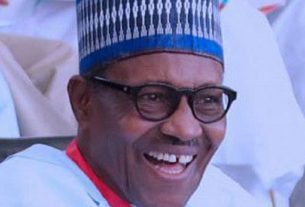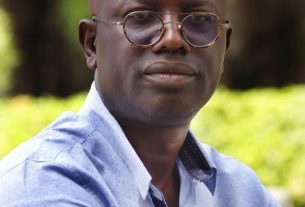By Tunde Odesola
Long before man dug a hole in every inch of the earth searching for oil, the crab had been in the business of oil drilling. The crab’s house – I mean its burrow – not its shell, is an oil rig at work.
For many Great Akokites, the most beautiful site in the University of Lagos isn’t the 13-storey Senate Building or the golden auditorium – it’s the Lagoon Front. The Lagoon Front is the wide-armed rendezvous where the vast Lagos Lagoon kisses Akoka’s scholarly shoreline, ohing and ahing as water caresses the bank…swoosh, slosh, splosh.
By day, the Lagoon Front is home to thinkers. By night, it’s a love nest to Romeos and Juliets exploring a soft-lit Eden. I was both thinker and wanderer, often tracing the scenic curvy road past the Lagoon Front toward the vice chancellor’s lodge, feet shuffling, thoughts flowing. Great Akokites! Great!
As a student, I was a regular daytime visitor to the Lagoon Front. There, I encountered the crab in its natural habitat. Its burrows were filled with oil water, and I always wondered what the crab had to do with oil. It never occurred to me to research the phenomenon.
But the song of Adawa King, Admiral Dele Abiodun, the Juju maestro, keeps whispering to me, “Epo ti alakan won se, lati bi odun mejo, ko i t’agolo ofo lo ja si,” meaning: “The palm oil being produced by the crab since three years ago, has not filled a single tin – wasted labour.”
Does the crab produce palm oil? I have answers now. The crab does not produce oil. Science says the claw-bearer burrows into mudflats, mangroves or brackish wetlands, where there’s a high amount of decaying organic materials like leaves, algae, or animal waste.
As these materials decompose, they release natural oils, fatty acids and hydrocarbons, forming the shiny or oily film that cloaks the crab’s burrow. Also, some crabs produce mucus-like substances to reinforce their burrows or line the walls. These secretions can reflect light and appear oily, especially when wet. Science washes oil off the burrow.
However, a morality tale in African mythology tells a story of the crab known locally as Akan or Alakan. The Akan isn’t just an armoured crawler, it’s a drunkard, a debtor, a trickster, who frequents the bar of Adaba the Dove, a brewer and merchant of enjoyment.
Regularly, the crab crawls sideways to the dove’s bar, drinks and stands up to go. “Where’s my money?” the dove asks. “I’ll pay you when I come tomorrow,” the crab replies.
The next day, Mr Crab, carrying his pincers like armoured tanks, comes visiting, drinking and enjoying himself. Dove: “Where’s the money for the drinks?” Crab: “I’ll pay you tomorrow.” Days turn into weeks, and Akan fails to fulfil his promise. A shouting match ensues one afternoon. Then, friends advise Akan to go and tell a debt collector — the slithering, cold-blooded Ejo the snake, whose business nomenclature is ògò – debt collecting.
The snake agrees to help Adaba retrieve its money from Akan. So, before Akan arrives the next day to binge, the snake is already seated. After drinking, the crab gets up and heads for the door. “Hey! Where’s my money?” “I’ll give it to you tomorrow.” The dove pounces and calls on the snake to help retrieve all his money. Wahala!
No one has seen the crab run so fast. Maybe the drink was anabolic steroids to its 10 legs. But the snake followed in hot chase, with the dove flapping behind them, cooing, “Bere mu kun-kun, bere mu kun-kun,” meaning – Grab it tightly! Grab it tightly!” But the crab narrowly makes it into its burrow. And, the dove becomes even more agitated, cooing wildly, “Bere mu kun-kun, bere mu kun-kun.”
This is a tricky test for the debt-collector, who pauses outside the burrow. Eventually, the snake inches its head into the burrow slowly; there was darkness and silence, then a sharp snap – ‘pai’ – and the snake swirls back outside in severe pain, writhing on the ground without its head. The debtor decapitates the debt collector; the crab has done its worst.
Nigeria is a crab republic. Since 1999, corruption wore a green-white-green agbada and sat in the saddle of democracy inside Aso Rock, aiding and abetting the crabs called leaders. Nigerian crabby leaders share similarities with the storied crab. Both sets are debtors, drunkards and tricksters.
Though aeons set the fabled crab and Nigeria’s crab-leaders apart, both are experts in fakery – producing fake oil, selling fake hope, and repaying kindness with evil. Nigerian crab leaders are meaner than the devil.
Where else but in the crabholes of Nigeria do herdsmen slaughter villagers by the hundreds without a single arrest? The crab government knows the killers, but peasant lives don’t matter in the burrows, nor do they matter in Benue, the current scene of bloodshed. Herdsmen are gods. Peasants are dogs.
The serpent swallowed its tail a long time ago when Jona-Dumb looked for his shoelace while the nation burnt, and the skeletal tyrant handed over the country to herdsmen before heading to Katsina ranch. Now, the mafia lord, cigar between clenched lips, presses down his Chicago boots on the masses’ neck, toasting to his impending 2027 electoral victory. “It is my turn!”
Since Olusegun Obasanjo’s reign, herdsmen have painted Nigeria red. Yet no killer has ever worn handcuffs (except once), no machete has been brought to court. But the DSS – Department of Supression and Suffocation – is hounding the call for a shadow government.
There is a WIKEd crab in Abuja, roaming freely and wildly – claws up, ready to fight even its own shadow. He epitomises the crab mentality that defines Nigerian politics – drag others down, cling to power, oppress the oppressed, kill and loot.
For security purposes, the mythical crab safeguards its carapace with its protruding eyes, “oju ni alakan fi n sori,” but the crabs lording it over Nigeria don’t give a hoot if herdsmen level a whole state since they have armed escort, armoured cars and their hands in the till.
If you think that Nigerians don’t know that President Bola Tinubu’s visit to Benue was just a photo opportunity aka photo-op, which will not stop the next bloodbath, take a look at the photo of the mother sitting by the wounded child’s bedside in the hospital when the Secretary to the Government of the Federation, George Akume, came calling. Her stare was icy, helpless and distant as if Akume and his well-fed band never existed. The picture captures Nigerians’ regret and loss of hope in the Tinubu government.
Popular social media influencer, Martins Vincent Otse, aka VeryDarkMan, visited Yelewata and interviewed an unnamed resident in the aftermath of the pogrom. The resident said the police engaged the killers, who later used another route to enter Yelewata and massacre.
Specifically, the resident mentioned Fulani herdsmen as the perpetrators of the mass murder carried out on the rainy night. Yes, rain fell, blood flowed, and the government yawned.
As national leader of the All Progressives Congress, I remember Tinubu disagreeing with those accusing herdsmen of being the killers of the daughter of Pa Reuben Fasoranti in 2022. Tinubu had asked, “Where are the cows?” But the police later arrested the killers, and the court sentenced them to death.
I implore Tinubu’s DSS to carry out a nationwide investigation to unravel if the herdsmen rode into Yelewata on cows. Maybe they will find some chewing cud beside the burnt corpses.
In Nigeria’s crab empire, cows roam, killer herdsmen thrive, lands abound without food, and oil wealth is meaningless. What is the name of a big-for-nothing country?
Email: tundeodes2003@yahoo.com
Facebook: @Tunde Odesola
X: @Tunde_Odesola
The Punch





